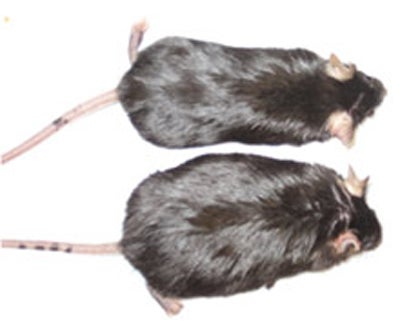Genetically Engineered Mice Can’t Get Fat
UCLA scientist give mice an E. coli gene that burns fat over carbs, preventing obesity

Since lab mice have been kind enough to start making baby formula for us, it might be nice to pay them back. Luckily, two UCLA scientists have the perfect gift: a bacterial gene that, when inserted into the rat genome, adds a new metabolic pathway that makes it impossible to get fat, no matter the carb content of the mouse’s diet.
As detailed in the latest issue of the journal Cell Metabolism, the E. coli gene affects the glucose metabolism of the mouse’s liver by adding a new chemical pathway that preferentially metabolizes fat over carbohydrates. So even if the mouse keeps packing away a never ending pasta bowl and free bread sticks, it will burn fat instead of gaining weight from the carbs.
Researchers discovered the obesity-preventing power of this gene by accident. They knew the gene related to carbohydrate metabolism, and engineered the gene into the mouse genome simply to help them identify important enzymes, not help the subject’s waist line.
Sadly, despite the unexpected obesity result, this discovery does not have an immediate clinical application. However, the enzymes identified by the study do hold the promise of some day imbuing humans with the same fat burning power the mice displayed.
“This is an interesting and viable way to look at metabolism,” said Katrina Dipple, an associate professor of human genetics and pediatrics and UCLA and a coauthor of the paper, “but we need to look deeper into the pathways to develop therapies.”